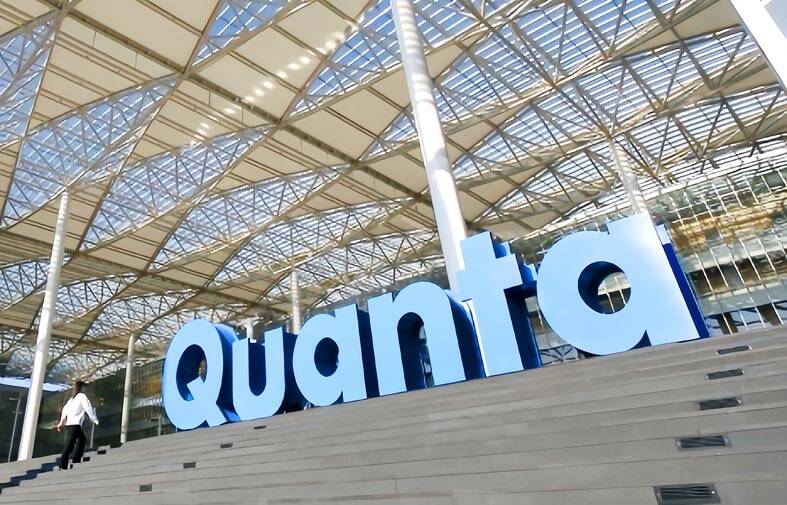A new convertible bond offering by a major supplier to Apple Inc is to add to the US dollar funds raised by Taiwanese tech firms this year, thanks to the hybrid securities’ popularity and demand for artificial intelligence (AI) investments.
Quanta Computer Inc (廣達), a MacBook contract manufacturer, is seeking to raise up to US$1 billion by selling convertible notes, it said in a filing on Friday last week.
The company said it would use the proceeds to buy raw materials.

Photo courtesy of Quanta Computer Inc
“We see the AI theme to be a fundamental change to the business mix and capital expenditure needs for the Taiwanese companies, which will set the trend for Taiwan’s equity capital markets over the next few years,” said Brian Chau, cohead of Asia equity-linked deals at UBS Group AG.
Global enthusiasm about AI is driving expansion plans by chipmakers and tech firms, many of which are based in Asia, leading to increased borrowing needs. Some are turning to convertible bonds given the high interest rates environment, as the hybrid notes’ equity component typically means coupons are lower than on regular debt.
Taiwanese companies have sold US$1.3 billion of US dollar-denominated convertible bonds so far this year, already surpassing the annual total raised in each of the past two years, Bloomberg-compiled data showed.
They also have issued a combined US$2.9 billion of additional shares in the US currency this year, exceeding any full-year figure since 2007.
The buyers of the recent share sales include sovereign wealth funds and long-only funds that seek exposure to AI, but historically have not invested in such firms, said Rob Chan, head of equity-linked origination for Asia Pacific at Citigroup Inc.
Taiwanese tech firms have been big beneficiaries of the AI frenzy. Chip giant Taiwan Semiconductor Manufacturing Co’s (台積電) US-listed shares have jumped 66 percent this year, while Quanta’s Taipei-listed stock is up about 20 percent.
The surge in US dollar funding by local firms also reflects their need to hedge against a weaker New Taiwan dollar. The NT dollar has dropped about 5 percent against the greenback this year, the second worst-performer in Asia behind the South Korean won.
While the recent pullback in AI-related stocks around the world might slow fundraising in the near term, additional share sales by Taiwanese companies are likely on tap for the next 12 to 18 months, Chau said.
Taiwanese tech companies that also have raised funds this year include computer storage devices maker Wiwynn Corp (緯穎), as well as semiconductor-related firms GlobalWafers Co (環球晶圓) and Alchip Technologies Ltd (世芯).
“There is a real use case for cash, given the growth of these businesses — it’s not about companies looking to take advantage of high stock prices,” Chan said. “I don’t think that a bit of market volatility is going to shut off the way that companies plan for accessing the markets to fund growth.”

Zhang Yazhou was sitting in the passenger seat of her Tesla Model 3 when she said she heard her father’s panicked voice: The brakes do not work. Approaching a red light, her father swerved around two cars before plowing into a sport utility vehicle and a sedan, and crashing into a large concrete barrier. Stunned, Zhang gazed at the deflating airbag in front of her. She could never have imagined what was to come: Tesla Inc sued her for defamation for complaining publicly about the vehicles brakes — and won. A Chinese court ordered Zhang to pay more than US$23,000 in

Taiwan Semiconductor Manufacturing Co (TSMC, 台積電) yesterday said that its investment plan in Arizona is going according to schedule, following a local media report claiming that the company is planning to break ground on its third wafer fab in the US in June. In a statement, TSMC said it does not comment on market speculation, but that its investments in Arizona are proceeding well. TSMC is investing more than US$65 billion in Arizona to build three advanced wafer fabs. The first one has started production using the 4-nanometer (nm) process, while the second one would start mass production using the

A TAIWAN DEAL: TSMC is in early talks to fully operate Intel’s US semiconductor factories in a deal first raised by Trump officials, but Intel’s interest is uncertain Broadcom Inc has had informal talks with its advisers about making a bid for Intel Corp’s chip-design and marketing business, the Wall Street Journal reported, citing people familiar with the matter. Nothing has been submitted to Intel and Broadcom could decide not to pursue a deal, according to the Journal. Bloomberg News earlier reported that Taiwan Semiconductor Manufacturing Co (TSMC, 台積電) is in early talks for a controlling stake in Intel’s factories at the request of officials at US President Donald Trump’s administration, as the president looks to boost US manufacturing and maintain the country’s leadership in critical technologies. Trump officials raised the

From George Clooney to LeBron James, celebrities in the US have cashed in on tequila’s soaring popularity, but in Mexico, producers of the agave plant used to make the country’s most famous liquor are nursing a nasty hangover. Instead of bringing a long period of prosperity for farmers of the spiky succulent, the tequila boom has created a supply glut that sent agave prices slumping. Mexican tequila exports surged from 224 million liters in 2018 to a record 402 million last year, according to the Tequila Regulatory Council, which oversees qualification for the internationally recognized denomination of origin label. The US, Germany, Spain,